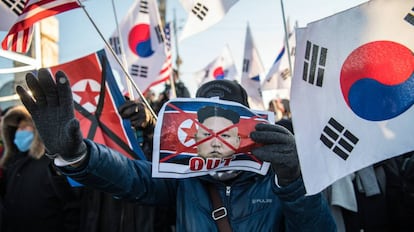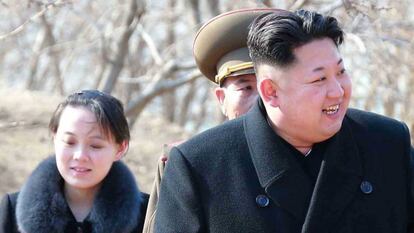For divided North Korean families, Seoul Winter Olympics fail to bridge gap
To the surprise of many, the regime of Kim Jong-un will be taking part in the Games, but family reunions are not on the cards


Kim Hyun-sook’s daughter was just two years old when she was forced to leave her behind in North Korea, fleeing during the country’s armed conflict with the South. When the 90-year-old was finally reunited with her child, in 2015 – the last reunion of separated Korean families to be permitted by the North and South Korean governments – she was shocked: “I saw an exhausted old woman. She looked as old as me, as though she were my sister and not my daughter. I had to ask her, ‘Are you Chun-buk?’”
I have always wanted to see them again but nothing has happened yet. And I don’t know if it ever will Kim Jeon
When North and South Korea agreed that the former could take part in the Seoul Winter Olympic Games, which will open on Friday, and even appear together at the inauguration parade, Hyun-sook was delighted. The mother of five, who lives in the South Korean capital, thought this was a small step toward reunifying the two countries and perhaps a new opportunity to reunite families separated by the war. But now, she says, she is “disappointed.”
North Korea has become one of the protagonists of Seoul 2018 before it has even begun. Its participation in the Games, which have been nicknamed “the peace Olympics” by the South, has been both sudden and unexpected. It has sent athletes to compete, musicians to perform in concerts, and hundreds of supporters to cheer on the teams. The head of state, Kim Yong-nam, has also agreed to attend the inauguration ceremony. He will be the highest official North Korea has ever sent to the south.
But as tensions rise over the North Korean nuclear program, and a military parade planned in the capital Pyongyang for Thursday, people in the South – where there is increasingly less support for reunification – are skeptical about the participation of the North in the Olympics. According to polls, 72% don’t see the joint presentation favorably.
Others, such as Kim and many other separated families, simply feel hurt. As part of last month’s negotiations, Seoul asked for separated families be allowed to reunite, but Pyongyang said they would only agree if South Korea handed over 13 North Korean deserters. “The attitude of the North is very disappointing. They also impose conditions and then change them according to what suits,” says Hyun-sook.
72% of South Koreans don’t have a favorable opinion of North Korea’s participation in the Games
Fewer than 60,000 South Koreans are listed on the registry of families separated by the war, a number that has dropped significantly from the 130,000 who were initially included. Almost 4,000 people on the list died last year, according to data from the Unification Ministry. Around 62% are over the age of 80.
“It is urgent for them to have a reunion,” says Kim Duck-soon, who governs one of South Korea’s northern provinces. “Many of them don’t have much time left.”
Cases such as that of Hyun-sook, who has been able to see her daughter again, are rare. South Korea uses a lottery system to select the participants of the reunions, which are organized by the International Red Cross. Between the 1980s and now, there have been only 21 family reunions, involving 20,000 people. The rest were left out.
We were like two strangers, we couldn’t feel like mother and daughter Kim Hyun-sook
Kim Jeong, an 87-year-old from the northern province of Hamkyung, has applied “seven or eight times” but has never been chosen. All of his family – his parents, brothers and sisters – stayed in North Korea. He arrived alone in the South when he was 19 years old. “For years, I would fall asleep every night crying,” he explain. “I have always wanted to see them again but nothing has happened yet. And I don’t know if it ever will.”
Hyun-sook’s family reunion was made possible because her granddaughter, who has a good position within the North Korean government, requested it. After the initial surprise over her daughter’s appearance, Hyun-sook says they had a stilted conversation, something other participants have described. What they were able to talk about during their 12-hour reunion in a hotel on the North Korean side of the border was strictly controlled and supervised. The amount of money South Koreans can give to their family in the North is also limited. “And in our case, too much time had passed without contact. We were like two strangers, we couldn’t feel like mother and daughter.”
Despite this, Hyun-sook was so excited she lost her voice for three days after she returned to Seoul. And although there will be no more family reunions – at least for the moment – she is hopeful that she will see her daughter again. Hyun-sook says she has prayed for years for reconciliation between the North and the South “because it was the only way of getting her back.” This Winter Olympics she will not see her daughter but, she says, “I hope and I desire that in the future, we will meet again.”
Kim Jong-un’s sister to attend Winter Games

Kim Yo-jong, the sister of the North Korean leader, Kim Jong-un, will travel with a delegation from North Korea to the South for the Winter Olympic Games in Seoul. This is the first time a member of the Kim dynasty has traveled to South Korea.
English version by Melissa Kitson.
Tu suscripción se está usando en otro dispositivo
¿Quieres añadir otro usuario a tu suscripción?
Si continúas leyendo en este dispositivo, no se podrá leer en el otro.
FlechaTu suscripción se está usando en otro dispositivo y solo puedes acceder a EL PAÍS desde un dispositivo a la vez.
Si quieres compartir tu cuenta, cambia tu suscripción a la modalidad Premium, así podrás añadir otro usuario. Cada uno accederá con su propia cuenta de email, lo que os permitirá personalizar vuestra experiencia en EL PAÍS.
¿Tienes una suscripción de empresa? Accede aquí para contratar más cuentas.
En el caso de no saber quién está usando tu cuenta, te recomendamos cambiar tu contraseña aquí.
Si decides continuar compartiendo tu cuenta, este mensaje se mostrará en tu dispositivo y en el de la otra persona que está usando tu cuenta de forma indefinida, afectando a tu experiencia de lectura. Puedes consultar aquí los términos y condiciones de la suscripción digital.








































